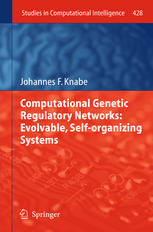

Most ebook files are in PDF format, so you can easily read them using various software such as Foxit Reader or directly on the Google Chrome browser.
Some ebook files are released by publishers in other formats such as .awz, .mobi, .epub, .fb2, etc. You may need to install specific software to read these formats on mobile/PC, such as Calibre.
Please read the tutorial at this link: https://ebookbell.com/faq
We offer FREE conversion to the popular formats you request; however, this may take some time. Therefore, right after payment, please email us, and we will try to provide the service as quickly as possible.
For some exceptional file formats or broken links (if any), please refrain from opening any disputes. Instead, email us first, and we will try to assist within a maximum of 6 hours.
EbookBell Team

4.8
84 reviewsGenetic Regulatory Networks (GRNs) in biological organisms are primary engines for cells to enact their engagements with environments, via incessant, continually active coupling. In differentiated multicellular organisms, tremendous complexity has arisen in the course of evolution of life on earth.
Engineering and science have so far achieved no working system that can compare with this complexity, depth and scope of organization.
Abstracting the dynamics of genetic regulatory control to a computational framework in which artificial GRNs in artificial simulated cells differentiate while connected in a changing topology, it is possible to apply Darwinian evolution in silico to study the capacity of such developmental/differentiated GRNs to evolve.
In this volume an evolutionary GRN paradigm is investigated for its evolvability and robustness in models of biological clocks, in simple differentiated multicellularity, and in evolving artificial developing 'organisms' which grow and express an ontogeny starting from a single cell interacting with its environment, eventually including a changing local neighbourhood of other cells.
These methods may help us understand the genesis, organization, adaptive plasticity, and evolvability of differentiated biological systems, and may also provide a paradigm for transferring these principles of biology's success to computational and engineering challenges at a scale not previously conceivable.